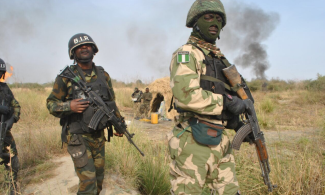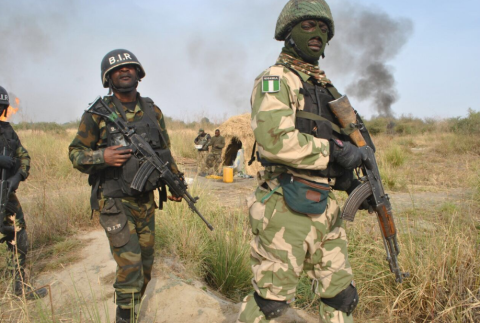
Lai Mohammed, the Minister for Information and Culture, also said repentant Boko Haram terrorists should not be prosecuted but treated as prisoners of war.
In the past few weeks, the news circle has been dominated by reports of repeated surrenders of Boko Haram terrorists to the Nigerian military. More than 2,000 terrorists were reported to have surrendered and branded ‘repentant’ by the Army, claiming adherence to international laws relating to ‘enemies willing to surrender’.
Lai Mohammed, the Minister for Information and Culture, also said repentant Boko Haram terrorists should not be prosecuted but treated as prisoners of war.

Though he later recanted, saying he only said they could not be killed and not that they could not be prosecuted.
Amidst controversies trailing the legitimacy of reintegrating terrorists into society, there have been concerns and conversations on and off social media.
While loyalists of President Muhammadu Buhari see the massive surrenders of the insurgents as a great milestone, observers and critics are sceptical, wondering if the weekly parades of repentant terrorists are not mere propaganda. This has raised a major question: why are these terrorists suddenly surrendering to the Army?
According to FIJ, the death of Boko Haram leader, Abubakar Shekau caused instability within the jihadist movement, as ISWAP hunted down any Boko Haram commanders who refused to swear allegiance to it, before it would resume its fight against government forces.
Sources added that ISWAP fighters carted away weapons from Shekau’s base and became even better armed. After the operation, as many as 18 Boko Haram commanders defected to the rival insurgent group.
“The Shekau empire collapsed after his death. Many of his foot soldiers became powerless because ISWAP took over their gunfires. The Shekau faction of Boko Haram became leaderless,” the newspaper quoted a source as saying.
Foot soldiers who left Shekau’s faction became insurgents without arms, leaving them with no option but to pledge allegiance to the ISWAP commanders.
ISWAP eventually realigned with Boko Haram to fight Nigerian soldiers and impose taxes on peasant farmers within their territories.
An interim council headed by Abu Mus’ab Al-Barnawi restructured the leadership of the extremist sect. The shake-up, FIJ gathered, was in line with a directive from the Islamic State of Iraq and Syria (ISIS), an international terrorist group that claims religious authority over all Muslims.
“After forming a coalition, many of Shekau’s fighters were arrested and incarcerated in an ISWAP prison at Tumbum Kayowa for committing various crimes. Also, commanders of the Shekau faction were reduced to junior fighters and marabout slaves in the ISWAP lair.
“The Shekau faction of Boko Haram fighters would rather renounce their participation in the terrorism campaign and surrender to the Nigerian troops than remain with ISWAP to continue facing humiliation in the camps.
“The massive surrenders of Boko Haram fighters are largely due to loss of confidence, maltreatment, and growing of insurrections between the ISWAP and members of the Jamā’at Ahl as-Sunnah lid-Da’wah Wa’l-Jihād (JAS) after the death of their leader, Abubakar Shekau.
“Earlier this month, ISIS sacked some leaders of Boko Haram in Nigeria, following the recent massive surrenders to the Army. Another reason for the sacking was the leaders’ failure to sustain the reunification of ISWAP and Boko Haram fighters after the demise of Abubakar Shekau.
“Basically, the Shekau faction of Boko Haram are the ones surrendering, not the ISWAP. Many of them could no longer go to farm since ISWAP fighters took over. So, they’re hungry.
“Suddenly, there was an outbreak of diseases such as cholera and malaria in their hideouts. They were also burdened by hunger because they could no longer farm. So, many of the insurgents were advised by their famished wives and relatives to surrender to the Army when they could not withstand the disaster that befell them,” the newspaper reported.